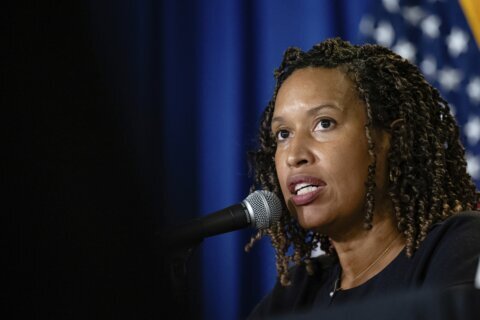A new report claims a gang-related list that D.C. police maintains is unreliable and may make life harder for innocent people.
“There are six criteria on how you get on the DC Gang Database, and they are not based off criminality,” said Carlos Andino, lead author of the report and associate counsel at the Washington Lawyers’ Committee for Civil Rights and Urban Affairs.
“They are based off associations, meaning that if you are observed associating with somebody who the police already have on their DC Gang Database, you too, can be placed on it,” he said.
Andino noted, for example, if you were cordially chatting with a neighbor when you happened to go to your mailboxes at the same time, and that neighbor happens to be in the database; and your conversation seemed too friendly to the police officer watching it, you could be considered to have a deeper relationship with them and be added to the database because of your association with that person.
“So, it’s a very low bar not based off any criminal factors, not based off conviction or going to a judge,” Andino said. “That means any one of us, based on who we talk with, who our neighbors are, could be put on this database.”
Once on the DC Gang Database, which has been in operation for more than a decade, the concern of the committee is that it can be a great detriment to people’s lives when the Metropolitan Police Department shares the information with other agencies.
“It can be used to impact people’s housing, i.e. deny them housing if they’re applying for a voucher or affordable housing,” Andino said. “It can be used as a reason to deny people employment, background checks, they can say ‘you can’t get this job. You’re not qualified because of a security risk.’”
Additionally, Andino said it has been used in the past to place children in different schools or to detain them longer than others because of the suspicion the database presents.
The report also says the DC Gang Database disproportionately impacts Black and Latinx residents, noting that of the over 1,900 people tracked during their study period, 83% were Black, 12% were Latinx and only 1% was white.
Andino believes there are better ways to deter crime in the city, such as putting more resources into helping those at risk of becoming involved with gangs.
Due to pending litigation matters, the Metropolitan Police Department said they were unable to answer specific questions, but offered the follow statement from Chief Pamela A. Smith:
“Arguments, disputes, and retaliation drive homicides and shootings in the District of Columbia. Maintaining an awareness of the affiliations of the people likely to be involved in violence — either as perpetrators or victims — is a critical part of reducing crime in our city. The Metropolitan Police Department maintains a criminal gang database as an investigative tool. The identification of gangs, and the validation of specific individuals as gang members, are pivotal to supporting our criminal justice ecosystem and safeguarding our communities.”
Get breaking news and daily headlines delivered to your email inbox by signing up here.
© 2024 WTOP. All Rights Reserved. This website is not intended for users located within the European Economic Area.








